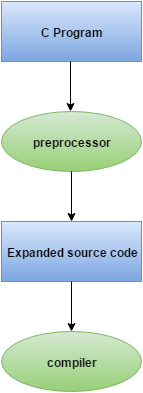C Preprocessor
The C preprocessor is a micro processor that is used by compiler to transform our code before compilation. It is called micro preprocessor because it allows us to add macros. It is not a part of the C compiler. It is a text substitution tool.

C Preprocessor Directives
All preprocessor directives starts with hash # symbol. Some of the preprocessor directives are :
- #include
- #define
- #undef
- #ifdef
- #ifndef
- #if
- #else
- #elif
- #endif
- #error
- #pragma
C Macros
A macro is a segment of code which is replaced by the value of macro. Macro is defined by #define directive. There are two types of macros:
- Object-like Macros
- Function-like Macros
Object-like Macros
The object-like macro is an identifier that is replaced by value. It is widely used to represent numeric constants. For example
#define PI 3.14
Here, PI is the macro name which will be replaced by the value 3.14.
Function-like Macros
The function-like macro looks like function call. For example
#define MIN(a, b) ((a)<(b)?(a):(b))
Here, MIN is the macro name.
C Predefined Macros
Some predefined macros that can be used in C program are
| Macro | Description |
|---|---|
| __DATE__ | represents current date in "MMM DD YYYY" format. |
| __TIME__ | represents current time in "HH:MM:SS" format. |
| __FILE__ | represents current file name. |
| __LINE__ | represents current line number |
| __STDC__ | It is defined as 1 when compiler complies with the ANSI standard. |
#include <stdio.h>
int main()
{
printf("File: %s\n", __FILE__);
printf("Date: %s\n", __DATE__);
printf("Time: %s\n", __TIME__);
printf("Line: %d\n", __LINE__);
printf("STDC: %d\n", __STDC__);
return 0;
}
Output :
File: 27.c
Date: Sep 8 2021
Time: 20:36:52
Line: 7
STDC: 1
#include
The #include preprocessor directive is used to paste code of given file into current file. It is used to include system-defined and user-defined header files. If included file is not found, compiler renders error.
By the use of #include directive, we provide information to the preprocessor where to look for the header files. There are two variants to use #include directive.
- #include <filename>
- #include "filename"
The #include <filename> tells the compiler to look for the directory where system header files are held. In UNIX, it is \usr\include directory.
The #include "filename" tells the compiler to look in the current directory from where program is running.
- In #include directive, comments are not recognized. So in case of #include <a//b>, a//b is treated as filename.
- In #include directive, backslash is considered as normal text not escape sequences. So in case of #include <a\nb>, a\nb is treated as filename.
- We can use only comment after filename otherwise it will give error.
#define
The #define preprocessor directive is used to define constant or micro substitution. It can use any basic data type.
#include <stdio.h>
#define PI 3.14
#define MIN(a, b) ((a)<(b)?(a):(b))
int main()
{
printf("Value of Pi = %f\n", PI);
printf("Minimum between 10 and 20 is %d: ", MIN(10, 20));
return 0;
}
Output :
Value of Pi = 3.140000
Minimum between 10 and 20 is 10
#undef
The #undef preprocessor directive is used to undefine the constant or macro defined by #define.
#include <stdio.h>
#define PI 3.14
#undef PI
int main()
{
printf("Value of Pi = %f\n", PI);
return 0;
}
Output :
error: 'PI' undeclared
#ifdef
The #ifdef preprocessor directive checks if macro is defined by #define. If yes, it executes the code otherwise #else code is executed, if present.
#include <stdio.h>
#define NoInput
int main()
{
int n;
#ifdef NoInput
n = 7;
#endif
printf("Value of a: %d", n);
return 0;
}
Output :
Value of n: 7
#ifndef
The #ifndef preprocessor directive checks if macro is not defined by #define. If yes, it executes the code otherwise #else code is executed, if present.
#include <stdio.h>
#define NoInput
int main()
{
int m = 1;
#ifndef Input
m = 25;
#endif
printf("Value of m: %d", m);
return 0;
}
Output :
Value of m: 1
#if
The #if preprocessor directive evaluates the expression or condition. If condition is true, it executes the code otherwise #elseif or #else or #endif code is executed.
#include <stdio.h>
#define Num 16
int main()
{
#if (Num == 16)
printf("Value of num is: %d", Num);
#endif
return 0;
}
Output :
Value of num is: 16
#else
The #else preprocessor directive evaluates the expression or condition of #if is false. It can be used with #if, #elif, #ifdef and #ifndef directives.
#include <stdio.h>
#define Num 16
int main()
{
#if (Num == 0)
printf("Value of num is: %d", Num);
#else
printf("Value of num is: %d", Num);
#endif
return 0;
}
Output :
Value of num is: 16
#error
The #error preprocessor directive indicates error. The compiler gives fatal error if #error directive is found and skips further compilation process.
#include <stdio.>
int main()
{
#ifndef PI
#error Value of PI is not defined
#else
printf("Value of PI is %f", PI);
#endif
return 0;
}
Output :
Compile Time Error: Value of PI is not defined
But, if we define PI, it does not gives error.
#include <stdio.>
#define PI 3.14
int main()
{
#ifndef PI
#error Value of PI is not defined
#else
printf("Value of PI is %f", PI);
#endif
return 0;
}
Output :
Value of PI is 3.140000
#pragma
The #pragma preprocessor directive is used to provide additional information to the compiler. The #pragma directive is used by the compiler to offer machine or operating-system feature. Different compilers can provide different usage of #pragma directive.
Comments
Post a Comment